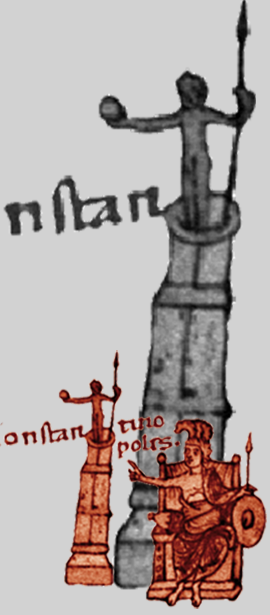The Power of Poetry in Late Byzantium
(FWF Project V9191, 28.2.2022-27.2.2025)
The writing and reading of poetry was a ubiquitous element of cultural expression in Byzantium, from late antiquity until the end of the Byzantine period in the mid-fifteenth century. Poems were read in school and performed in ceremonies; they were inscribed on buildings and portable objects; they were sent as letters and discussed in literary gatherings. As an integral part of literary production, every (even semi )literate Byzantine was acquainted with poetry, and confronted with it in a variety of social occasions. Poetry was a means of self-fashioning and social maneuvering for authors and patrons, where aesthetic choices could have a real influence on the lives of those involved. Due to this importance, poetry has lately received increased attention in Byzantine Studies; and yet, while the early and middle Byzantine periods have been intensively treated, late Byzantine poetry is still largely terra incognita. This period stands out for the wide variety of literary, social, political, and regional contexts in which poetry was produced, and naturally influenced its literary form and function. While the Constantinopolitan upper class was the principal setting of poetic production in the earlier periods, in the late period the writing of poetry reached even greater social and spatial extent, and was often related to the building of an orthodox, Greek identity in a time when Byzantium as a political entity had lost much of its influence.
The corpus under investigation includes all metrical texts in the Greek language (save for hymnography and long narrative poems) produced between the 13th and the middle of the 15th centuries. These add up to about 65,000 verses, or 2,800 poems, written by 160-odd named authors as well as numerous anonymous ones. The principal aim of this project is the production of the first comprehensive monograph examining the totality of these texts. By applying an innovative approach combining literary studies with cultural studies and social history, the monograph will discuss the aesthetic values and the social impact of poetry production and consumption in a politically fragmented world, extending from Southern Italy to the Black Sea. Central to this literary analysis will be a scholarly imagining of poetry’s form, literary quality, and beauty, as seen through Byzantine eyes. Furthermore, careful study of the social settings of the composition, reading, and performance of poetry, as well as of the interactions of author, text, and audience, will allow for a deeper understanding of the impact of literature on social life.
Far from being an arcane literary phenomenon, the production and consumption of poems was an integral part of late Byzantine cultural life. This project will, for the first time, offer a comprehensive study of the power of poetry in late Byzantium.
Publications
“Greek Poetry in a Multicultural Society: Sicily and Salento in the Twelfth and Thirteenth Centuries”, co-authored with N. Zagklas, in Why Write Poetry? Transcultural Perspectives from the Later Medieval Period, Special Issue of Medieval Encounters, ed. by K. Kubina & N. Zagklas; forthcoming 2024.
“Tuning the Pen: Poetry Writing and the Search for New Patrons around the End of the Byzantine Empire”, Byzantine and Modern Greek Studies 47/1 (2023): 18–36.
“Worshipping Verse: Liturgy and Occasionality in Nikephoros Kallistou Xanthopoulos’s Poetic Oeuvre“, co-authored with M.-L. Goiana, in Cult, Devotion, and Aesthetics in Later Byzantine Poetry (12th to 15th Centuries), ed. by K. Kubina & M.-L. Goiana; forthcoming.
“Mapping the Poetic Landscape of Late Byzantium”, in Poetry in Late Byzantium, ed. by K. Kubina; forthcoming.
Events / Veranstaltungen
„Poetry, Homer, and Narrativity in Later Byzantium. A discussion of work in progress”, Brno, Czech Academy of Sciences, 14 June 2024.
„Rhetorics of Change: Literary Agency in the Tumultuous 15th Century”, International Medieval Congress Leeds, Session 606, 4 July 2023.
Interdisciplinary Conference: „Personal Stories from the Literary Landscapes of the Agitated (post-)Byzantine World (13th to 16th c.): Intercultural Perspectives“, 17-19 April 2024


